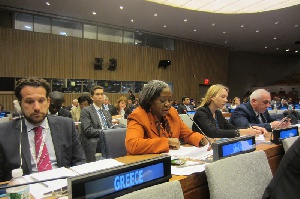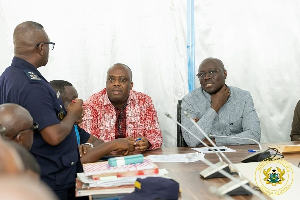Ghana has urged the international community to put an end to all forms of slavery, by addressing the false ideologies and racial prejudices that give rise to racism, discrimination, intolerance and exploitation worldwide.
At a special meeting at the UN Headquarters in New York on Tuesday (March 29, 2016) to mark the 200th anniversary of the abolition of the transatlantic slave trade, Ambassador Martha Ama Akyaa Pobee, Ghana's Permanent Representative to the United Nations emphasized the need for dignity and equality of all human beings in accordance with the universal declarations of the UN.
"Mere remembrance without positive action does not make for progress or renewal. Therefore, the commemoration should serve as a time for deep reflection and collective action" she stated.
"It is fitting that we remember the dark era in the history of mankind, during which millions of African women, men and children were taken as slaves from the continent and transported from their homelands to destinations in Europe and the Americas in inhuman conditions and treated as commodities", the Ambassador stated, adding that "It is also right that we honour the victims of slavery and those who opposed and triumphed over this crime. Their strength of will and resilience continue to inspire us today.", Ambassador Pobee stated at the event, which fell on the International Day of Remembrance of the Victims of Slavery and the Transatlantic Slave Trade.
She commended the efforts of the UN system to educate current and future generations on the contemporary consequences of the tragedy of human history.
Many visitors to the Cape Coast and Elmina castles in Ghana which bear haunting memories of the heinous crime of slavery, have the opportunity to see the "Door of No Return", from where slaves were put onto ships bound for the Americas. Today visitors to the UN headquarters will also see the Permanent memorial named the "Ark of Return", the Ambassador noted.
Speaking on "Remember slavery and celebrate the heritage, culture and roots of the African Diaspora", an Anthropologist and Executive Director of the Global African Diaspora, Dr. Shelia S. Walker mentioned that out "of the 6.5 million people who crossed the Atlantic between 1500 and 1800, only one million came from Europe. Five and a half million came from Africa. So for the first 300 of the 500 year history of the modern Americas, the overwhelming majority of the population was of African origin.
'The unremunerated labour of these enslaved Africans and their descendants enriched Europe and developed the Americas. Between 1650 and 1850 they produced 75 per cent of the commodities traded in the Atlantic world, fueling the industrial revolution that created today's economic system. It is impossible to tell the story of the Americas without considering the roles and contributions of this majority of the population that laid its foundations".
Even when industrialization replaced slavery in the 1800s, Dr. Walker revealed further that "people of African descent received no compensation for their centuries of unpaid work. In the British, French and Spanish Empires, in Brazil, and in Washington, DC, however, enslavers were rewarded by their governments with generous compensation for the loss of the income they would no longer derive from the free labor of their former human property. So the same people who for hundreds of years were enriched by the enslavement of people of African descent were further enriched by their emancipation".
It is generally assumed that Africans were enslaved just as unskilled laborers. Such a perspective is illogical given that Africans were brought across the Atlantic to create new societies often in natural environments more familiar to them than to their enslavers. Some Africans were enslaved precisely because of their skills and knowledge. They provided a transfer of technology from Africa to the Americas.
Dr. Walker said that "People from the Gold Coast, now Ghana, whom the Portuguese and Spanish called Negros minas, "Mine Negros," were selected for their expertise in gold mining and metallurgy. In Ecuador and Colombia descendants of negros minas still pan gold and transform it into beautiful creations".
Added to these, the respected Anthropologist said "African knowledge also helped feed the Americas. In Brazil, Jamaica, Suriname and the United States, enslaved Africans planted rice that had been domesticated 3500 years earlier in Mali. U.S. plantation owners asked slave ship captains to bring them "Rice Negros" known for their expertise in the complex cultivation and preparation techniques. South Carolina became North America's richest plantation economy thanks to this African rice".
During the debate, all the members who spoke condemned slavery and alluded to the fact that the philosophy which holds one race superior and another inferior is evil and must be "discredited and abandoned' .
Quoting Martin Luther King, one of them said that "injustice anywhere is injustice all over the world" and therefore urged mankind to avoid any form of enslavement and injustice all over the world.
Diaspora News of Thursday, 31 March 2016
Source: Permanent Mission of Ghana to the United Nations,













